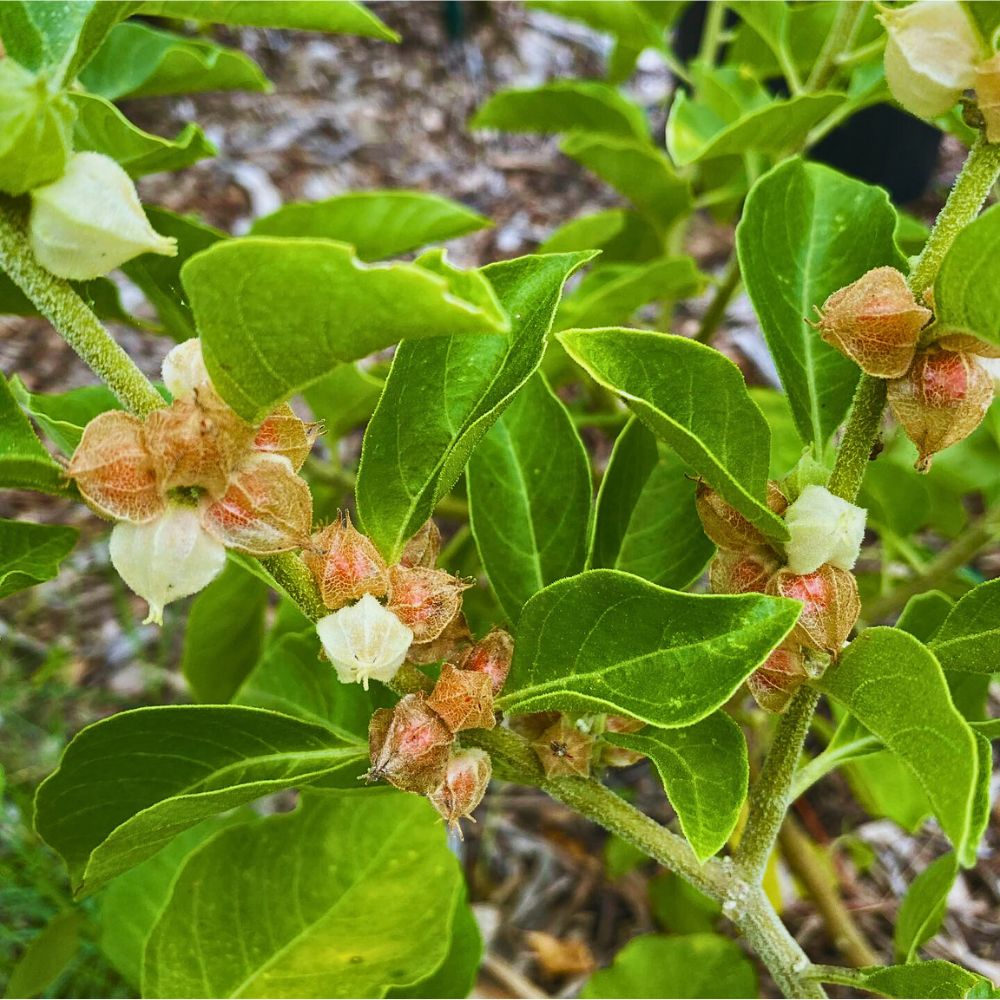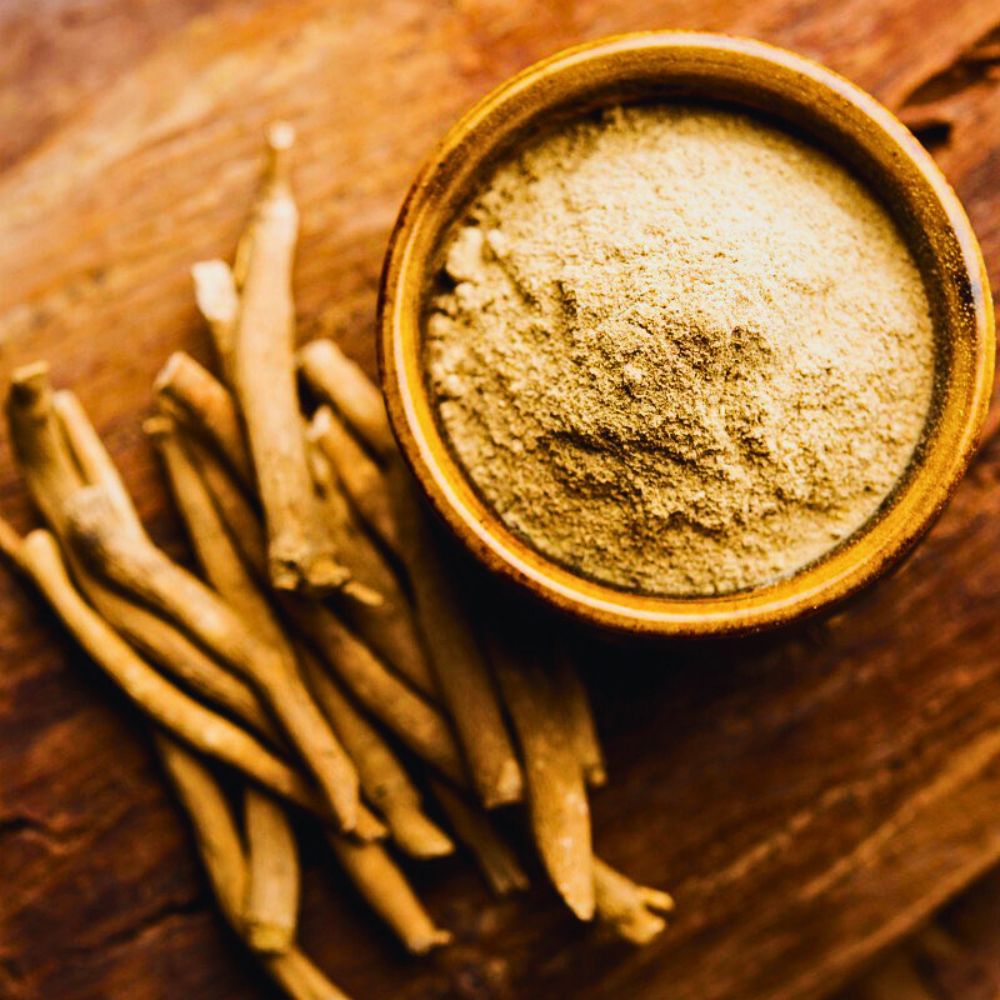Ashwagandha (Withania somnifera) has journeyed through ancient Ayurvedic apothecaries to modern clinical laboratories, without losing the intrigue that first earned it a place in South-Asian medical lore, and therefore isn't just another trending superfood that will soon fade into obscurity. This adaptogenic herb has been quietly reinventing health and wellness for thousands of years, and contemporary science is finally catching up to what ancient practitioners knew all along, proving that its benefits are many more than what traditional and herbal medicine first documented.
Today’s scientists dissect the withanolide-rich ashwagandha root while people use its powder, searching for well-being, clarity, and calm. The scientific community's growing fascination with this plant arises from its unique ability to adapt to what the body needs most. Whether one struggles with chronic stress, battles fatigue, or simply looks to optimize their overall health, this ancient herb might just be the missing piece in the wellness puzzle. Research, therefore, continues to reveal new uses and confirm the traditional ones, making this one of the most thoroughly studied adaptogenic herbs in modern times. There are, therefore, so many uses and benefits of the ashwagandha that one should know about.
Understanding Ashwagandha’s Remarkable Stress-Fighting Properties
The basis of ashwagandha's repute lies in its extraordinary ability to fight stress at both physiological and psychological levels. When one constantly juggles work deadlines, family responsibilities, and life's unexpected curveballs, the body's stress response system can become chronically activated. This is where ashwagandha shines. It acts as a biological buffer against the harmful effects of prolonged stress exposure.

The ashwagandha root, for starters, contains powerful compounds called withanolides, which are primarily responsible for the herb's stress-reducing properties. These bioactive molecules work by modulating the body's hypothalamic-pituitary-adrenal axis, essentially helping to normalize the stress response system. Instead of remaining in a constant state of high alert, the body learns to distinguish between genuine threats and everyday stressors, responding more appropriately to each situation.
Also, ashwagandha is particularly fascinating due to its ability to lower cortisol levels without completely suppressing this important hormone. Cortisol plays essential roles in the body's daily functions, including regulating blood sugar, controlling inflammation, and managing humans’ sleep-wake cycle. Rather than eliminating cortisol entirely, ashwagandha helps restore healthy cortisol rhythms, allowing one to feel more balanced and resilient throughout the day.
Read more in 'A Comprehensive Guide to Understanding What Is Ashwagandha Plant'.

Studies consistently show that people taking ashwagandha supplements experience notable reductions in perceived stress, often along with improvements in overall quality of life. The herb's stress-relieving effects go beyond just easing symptoms, actually helping to protect the body from the long-term damage that chronic stress can cause to the cardiovascular, immune, and nervous systems.
Ashwagandha for Physical Performance and Athletic Benefits
Athletes and fitness enthusiasts are increasingly turning to ashwagandha as a natural performance booster, and the research supporting this trend is quite convincing. The herb's ability to enhance strength, power, and endurance has been backed by numerous clinical trials, making it an appealing alternative to synthetic performance supplements.

One of the most impressive aspects of ashwagandha's athletic benefits is its impact on muscle mass and strength development. Regular supplementation has been shown to significantly increase muscle mass and reduce body fat percentage, particularly when combined with resistance training. This twin effect makes it particularly valuable for anyone looking to improve their body composition naturally.
The benefits of ashwagandha for men in athletic contexts are particularly notable. Research indicates that men taking ashwagandha supplements often experience greater increases in muscle strength, particularly in bench press and leg extension exercises. Additionally, the herb appears to accelerate recovery between training sessions, allowing for more frequent and intense workouts without the typical fatigue and soreness that can limit training progression.
Endurance athletes also benefit significantly from ashwagandha supplementation as the herb has been shown to improve cardiovascular efficiency, allowing athletes to maintain higher intensities for longer periods. This improvement in aerobic capacity translates to better performance in activities ranging from cycling and running to swimming and team sports.

Away from raw performance metrics, ashwagandha helps athletes maintain mental focus and clarity during training and competition. Its stress-reducing properties prevent the mental fatigue that can compromise performance, particularly during high-pressure situations. This psychological benefit often proves just as valuable as the physical improvements athletes experience.
Ashwagandha’s Cognitive Enhancement and Mental Clarity Benefits
The relationship between ashwagandha and cognitive function is one of the most exciting areas of current research. As understanding of the brain-body connection grows, scientists are discovering that ashwagandha's benefits go beyond stress reduction to include significant improvements in memory, focus, and overall cognitive performance.

Regular ashwagandha use has been shown to enhance both immediate and delayed memory recall, making it particularly valuable for students, professionals, and anyone dealing with age-related mental decline. The herb appears to work by protecting brain cells from oxidative stress and inflammation, two primary factors that contribute to cognitive deterioration over time.
Furthermore, the “What are the benefits of ashwagandha?” question is even more relevant when discussing neuroprotection. The herb's antioxidant properties help in shielding brain tissue from damage caused by free radicals, potentially slowing the aging process and reducing the risk of neurodegenerative diseases. This protective effect is especially pronounced in areas of the brain responsible for memory formation and retrieval.
Attention and focus are other areas where ashwagandha exhibits remarkable benefits. People taking the herb regularly often report improved ability to concentrate on tasks, reduced mental fog, and enhanced clarity of thought. These improvements appear to be particularly pronounced during stressful periods, suggesting that ashwagandha's cognitive benefits are closely tied to its stress-reducing properties.

The herb's impact on executive function, including planning, decision-making, and problem-solving abilities, has also attracted significant research attention. Studies show that ashwagandha use can enhance performance on cognitive tasks that require sustained attention and complex reasoning, making it valuable for individuals whose work or studies demand high levels of mental acuity.
Sleep Quality and Restorative Benefits of Ashwagandha
Anyone scrolling late at night will inevitably type: “How much ashwagandha per day for sleep” into a search bar. In essence, sleep quality is one of the most overlooked yet crucial aspects of health, and ashwagandha's ability to improve sleep patterns has made it increasingly popular among those struggling with insomnia and other sleep disorders. The plant's impact on sleep extends beyond simply helping one fall asleep faster; it actually improves the quality and restorative nature of sleep cycles.

Understanding how much ashwagandha per day for sleep requires considers both the severity of sleep issues and individual response patterns. Most research suggests that doses ranging from 300 to 600 milligrams taken before bedtime can significantly improve sleep onset time and overall sleep quality. However, some individuals may find that smaller doses taken consistently over time provide better results than larger single doses.
The mechanism behind ashwagandha's sleep-promoting effects involves its impact on the nervous system's ability to transition from an active, alert state to a calm, receptive state necessary for quality sleep. It helps regulate neurotransmitter levels, particularly GABA, which plays a crucial role in promoting relaxation and preparing the body for sleep.
Additionally, what makes ashwagandha especially valuable for sleep improvement is its ability to target the root causes of sleep issues rather than just masking symptoms. Many sleep problems arise from high stress hormones, racing thoughts, or physical tension, all of which ashwagandha naturally helps to address by lowering cortisol levels and promoting relaxation. As a result, it creates ideal conditions for restorative sleep.

The quality of sleep experienced with ashwagandha supplementation often improves progressively over time. Users frequently report deeper, more refreshing sleep, fewer nighttime awakenings, and improved morning alertness. These improvements in sleep quality often translate into better daytime performance, mood stability, and overall quality of life.
Ashwagandha Benefits for Hormonal Balance and Reproductive Health
The endocrine system's composite network of hormones affects virtually every aspect of health, and ashwagandha's ability to support hormonal balance makes it resourceful for addressing a wide range of health concerns. Its adaptogenic properties help normalize hormone production and regulate the delicate balance between different hormonal systems.
Also convincing are the benefits of ashwagandha for women, especially during hormonally turbulent phases. Preliminary studies in peri-menopausal cohorts note smoother mood, fewer hot flashes, and deeper sleep, outcomes credited to better cortisol-estrogen balance and modest thyroid support. Because stress can blunt estrogen and progesterone, adaptogenic modulation offers a physiological rationale for these improvements.

The benefits of ashwagandha for women, so, include significant improvements in reproductive health and hormonal balance, regulation of menstrual cycles, reduced symptoms associated with menopause, and supporting healthy thyroid function. Women dealing with polycystic ovary syndrome (PCOS) may find ashwagandha particularly beneficial, as it improves insulin sensitivity and reduces androgen levels.
Thyroid health is also a case where ashwagandha shows amazing benefits. It has been shown to support healthy thyroid function in people with subclinical hypothyroidism, helping to normalize thyroid hormone levels naturally. Its support for thyroid health guarantees improved energy levels, better metabolism, and enhanced overall well-being.
For men, ashwagandha's impact on testosterone production has received quite some research attention. Studies have shown that men taking ashwagandha supplements often experience increases in testosterone levels, particularly those dealing with stress-related testosterone decline. This hormonal support means improved muscle mass, enhanced libido, and better overall vitality.

What’s more, ashwagandha’s ability to reduce cortisol levels plays a crucial role in supporting healthy hormone production across all systems. Chronic stress and elevated cortisol can disrupt the production of sex hormones, thyroid hormones, and insulin, leading to a cascade of problems. Helping to normalize cortisol levels, ashwagandha creates optimal conditions for healthy hormone production and balance.
Immune System Support and Anti-inflammatory Benefits of Ashwagandha
The immune system's ability to protect against illness and maintain overall health depends heavily on the body's inflammatory response remaining balanced and appropriate. Ashwagandha's impressive anti-inflammatory and immune-supporting properties make it valuable for maintaining optimal health and potentially reducing the risk of chronic diseases.

The “What are the health benefits of ashwagandha?” question is likewise more relevant when discussing immune function, as the herb contains compounds that help modulate immune system activity, supporting healthy immune responses while preventing the overactive inflammation that can contribute to chronic diseases and autoimmune conditions.
Moreover, ashwagandha's impact on white blood cell function has been documented in numerous studies, showing that it improves the activity of natural killer cells and other immune system components. The enhancement of immune function means better resistance to infections and faster recovery from illnesses. Plus, its anti-inflammatory properties also include benefits for cardiovascular health, joint comfort, and overall cellular well-being. Still, while chronic inflammation contributes to many age-related diseases, ashwagandha's ability to regulate inflammatory responses may contribute to healthy aging.

Even still, research has shown that ashwagandha supplementation can help reduce various markers of inflammation in the body, including C-reactive protein and other inflammatory cytokines, which in turn, could contribute to improved energy levels, better mood stability, and enhanced overall well-being.
Ashwagandha Dosage Guidelines and Usage Recommendations
Understanding proper dosage is a key aspect of maximizing ashwagandha's benefits while minimizing potential side effects. Ashwagandha recommended dosage varies depending on the specific health goals, individual sensitivity, and the form of ashwagandha being used. Most research studies have used doses ranging from 300 to 600 milligrams of standardized ashwagandha extract taken daily, typically divided into two doses. However, some studies have used higher doses, up to 6 grams of root powder daily, without significant adverse effects. Starting with lower doses and gradually increasing allows individuals to assess their response and find their optimal dosage.

On the other hand, the inquiry of how often one should take ashwagandha depends on individual goals and response patterns. Most people find that consistent daily use provides the best results, as the plant’s adaptogenic effects tend to build over time. Some individuals prefer taking their full dose at bedtime to maximize sleep benefits, while others find that splitting the dose between morning and evening provides better overall results.
The timing of ashwagandha supplementation can also influence its effects significantly. Taking it with meals can help reduce the likelihood of stomach upset, while taking it on an empty stomach may enhance absorption. For sleep-related benefits, taking ashwagandha 30 to 60 minutes before bedtime often provides optimal results. For “what are the benefits of taking ashwagandha?”, they consistently build over time, and include cumulative improvements in stress resilience, energy levels, and overall well-being. Most people begin noticing benefits within a few weeks of consistent use, with more significant improvements typically developing over several months of regular use.

Potential Side Effects and Safety Considerations of Ashwagandha
While ashwagandha is generally considered safe for most people when used appropriately, understanding potential side effects and safety considerations is essential for responsible use. Its powerful effects on various body systems mean that certain individuals may experience adverse reactions or interactions with medications.
Common side effects of ashwagandha are typically mild and may include drowsiness, stomach upset, or diarrhea. These side effects are often dose-dependent and may resolve as the body adapts. Starting with lower doses and gradually increasing can help minimize these initial symptoms. The ashwagandha side effects for males may include changes in hormone levels, particularly in men with existing hormonal imbalances. While many experience beneficial increases in testosterone levels, those with hormone-sensitive conditions need to consult healthcare providers beforehand.

Pregnant and breastfeeding women ought to avoid ashwagandha supplementation, as it may have effects on hormone levels and uterine contractions. Additionally, people with autoimmune conditions like rheumatoid arthritis, lupus, or multiple sclerosis need to be cautious, as ashwagandha's immune-stimulating properties could potentially exacerbate these conditions. It is also advisable that those taking medications for blood sugar, blood pressure, or thyroid conditions consult healthcare providers before using ashwagandha, as it may interact with these prescriptions. Regular monitoring may be necessary to ensure safe and effective use.
Importantly, the quality and purity of ashwagandha supplements can vary significantly between producers, meaning it is important to choose reputable products that provide third-party testing and standardized extracts. These guarantee that one gets a consistent, pure product that delivers the expected benefits while minimizing the risk of contamination or adulteration.

Integrative Perspective and Ongoing Research on Ashwagandha
While facts support ashwagandha’s cortisol modulation, fertility enhancement, and sleep promotion, meta-analyses sometimes brand the evidence ‘low-certainty’ because of small sample sizes and heterogeneous extracts. Continuing research explores standardized withanolide ratios for other conditions like PTSD, subclinical hypothyroidism, and even post-viral fatigue. Still, ethnobotanists are cataloguing related Solanaceae species, investigating whether milder alkaloid blends might deliver gentler results for sensitive individuals.
Feature image by @michaelshealth, header image by @wfn_naturals.










